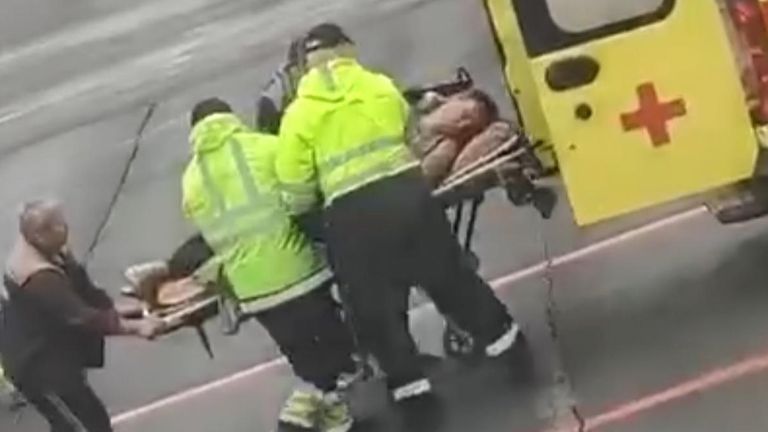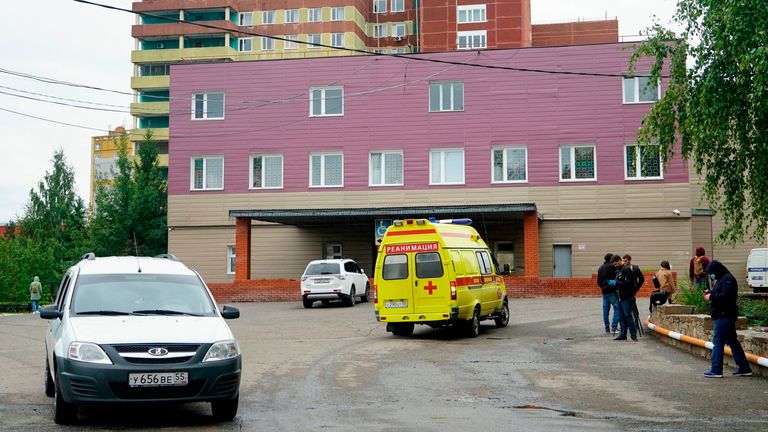Russian doctors say there is no evidence Alexei Navalny was poisoned and have banned the Putin critic from being transported abroad.
The 44-year-old’s spokeswoman previously said doctors had caved to Kremlin pressure – but medics said the decision was made because he was not well enough.
The long-time critic of President Vladimir Putin is fighting for his life on a ventilator after drinking tea that allies believe was laced with poison.
Speaking to reporters on Friday, deputy chief doctor Anatoly Kalinichenko at Omsk hospital said that as of today, no traces of poison were found in Mr Navalny’s body.
The politician’s spokeswoman Kira Yarmysh posted a video on Twitter of Kalinichenko speaking.
“Poisoning as a diagnosis remains on the back burner, but we don’t believe that the patient suffered from poisoning,” Mr Kalinichenko said.
A plane had apparently been due to transport Mr Nevalny to Germany for treatment following the alleged poisoning.
He fell ill on a flight back to Moscow from Tomsk, a city in Siberia, and was taken to a hospital after the plane made an emergency landing in the Russian city of Omsk.
Mr Navalny‘s wife cited a police officer as saying a “very dangerous” poison had been detected in his body that posed a risk to everyone around him who should therefore wear protective suits, local media reported.
However, head doctor of Omsk hospital, Alexander Murakhovsky, declined to answer questions on whether Mr Navalny was poisoned or not and is yet to confirm a diagnosis.
:: Listen to Polonium and the Piano Player on Apple Podcasts, Spotify, Spreaker or wherever you get your podcasts.
He said the Russian opposition leader’s condition had improved a little, but that it was still unstable and that attempting to move him could pose a risk to life.
Mr Navalny’s spokeswoman said the hospital refused to move him to another facility against his family’s wishes.
“The ban on the transportation of Navalny is only needed to stall for time and wait until the poison in his body can no longer be traced. Moreover, every hour of delay creates a critical threat to his life,” Ms Yarmysh wrote on social media.
She said a German air ambulance with a team specialised in treating coma patients was due to land in Omsk at around 6am, and that doctors had previously agreed to move him, but had changed their mind at the last minute.
“This decision, of course, was not made by them, but by the Kremlin,” she said.
The Kremlin said on Thursday that medical authorities would promptly consider any request to move Mr Navalny to a European clinic and were being open about his condition.
Mr Navalny’s allies want to take him out of the country to be treated, but Dr Murakhovsky said many legal questions would need to be resolved before that could happen.
He said top doctors had been flown in from Moscow to treat the politician and that there were five possible diagnoses of his condition – with test results becoming available in two days.
Britain’s Foreign Secretary Dominic Raab previously said he was “deeply concerned” about the reported poisoning, adding: “My thoughts are with him and his family.
And French President Emmanuel Macron offered France’s help, saying: “We are clearly ready to provide all necessary assistance to Alexander Navalny and those close to him in terms of healthcare, in terms of asylum, and protection, that is clear. I hope he can be saved.”



